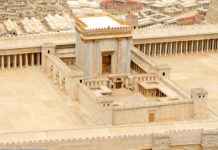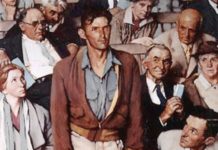The Church of Jesus Christ of Latter Day Saints (LDS) headquarters in Salt Lake City governs a global institution comprising 16 million people. How did this marginalized sect become the world’s fourth largest Protestant denomination? How might it serve as a model for Cheon Il Guk?
As does Catholicism, the LDS offers an actionable, life-encompassing path to heaven. In its theology, there are three kingdoms in spirit world—the Celestial, Terrestrial and Telestial. Some think Joseph Smith read Swedenborg, as his teachings on spirit world are extensive and detailed.
The LDS offers an actionable, life-encompassing path to heaven.
The LDS path by which to reach the highest realm in heaven is marked by church “ordinances,” through which adherents make covenants with God and the community. Parallel to Catholic sacraments, these are baptism, confirmation, “the sacrament” (holy communion), priesthood ordination, endowments (which bestow spiritual gifts upon both men and women), and celestial marriage.
These ordinances, most of which are given in temples only, are “symbolic acts and covenants designed to prepare participants to officiate in priesthood ordinances, and to give them the key words and tokens they need to pass by angels guarding the way to heaven.”
Receiving ordinances requires, as a baseline, adherence to church laws of sexual purity, health, fasting, Sabbath observance and tithing ten percent of one’s income. Violation of laws other than chastity does not result in expulsion, but it does disqualify one from receiving the ordinances.
Positions from Bishop to Music Director require the regular endorsement of the congregation.
In addition to rituals, commitments and lifestyle, advancement on the path to heaven requires that one live a life of good repute on earth. Positions in spirit world correspond in a broad sense to positions on earth. In other words, an active member progressing on the spiritual path will have been called to, and approved for, positions of responsibility in the church on earth.
The assumption and continuation of many such positions, from Bishop to Music Director, require the regular endorsement of the congregation in which he or she serves by a show of hands. This means that every Mormon leader has taken on increasing responsibility, from the bottom up, under the public gaze of his or her community and with its formal approval through a kind of election. So, yes, the LDS conducts elections. Tons of them.
We’ll talk about what these elections look like, and other features of the LDS model, next time.
(Citations: https://en.wikipedia.org/wiki/Degrees_of_glory; https://en.wikipedia.org/wiki/Endowment_(Latter_Day_Saints); https://en.wikipedia.org/wiki/The_Church_of_Jesus_Christ_of_Latter-day_Saints; https://en.wikipedia.org/wiki/Council_of_Fifty; Dr. Tom Bowers)








i have tremendous respect for LDS-im curious what polices they have for financial accountability-especially in light of their great financial foundation